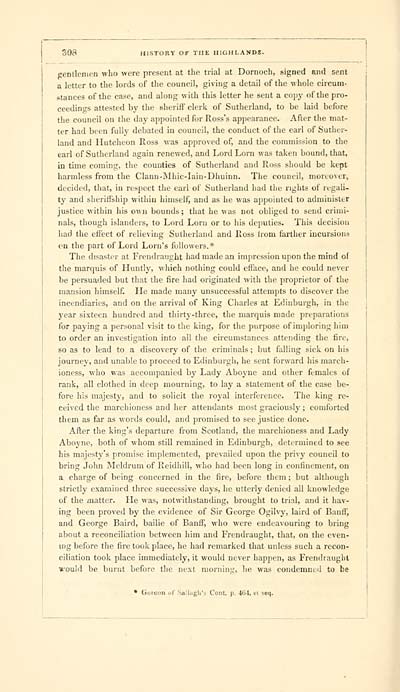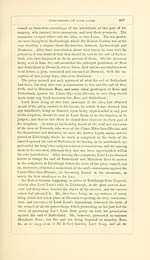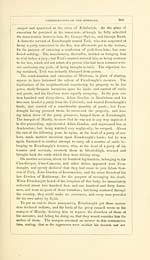Download files
Complete book:
Individual page:
Thumbnail gallery: Grid view | List view

308 HISTORY OF THE HIGHLANDS.
"entlenien who were present at the trial at Dornoch, signed and sent
a letter to the lords of the council, giving a detail of the whole circum-
stances of the case, and along with this letter he sent a copy of the pro-
ceedings attested by the sheriff clerk of Sutherland, to be laid before
the council on tlie day appointed for Ross's appearance. After the mat-
ter had been fully debated in council, the conduct of tlie earl of Suther-
land and Hutcheon Ross vas approved of, and the commission to the
earl of Sutherland again renewed, and Lord Lorn was taken bound, that,
in time coming, the counties of Sutherland and Ross should be kept
harmless from the Clann-Mliic-Iain-Dhuinn. The council, moreover,
decided, that, in respect the earl of Sutherland had the rights of regali-
ty and sheriffship within himself, and as he was appointed to administer
justice within his own bounds ; that he v as not obliged to send crimi-
nals, though islanders, to Lord Lorn or to his deputies. This decision
had the effect of relieving Sutherland and Ross from farther incursions
on the part of Lord Lorn's followers.*
The disaster at Frendraught had made an impression upon the mind of
the marquis of Huntly, wliich nothing could efface, and he could never
be persuaded but that the fire had originated with the proprietor of the
mansion himself. He made many unsuccessful attempts to discover the
incendiaries, and on the arrival of King Charles at Edinburgh, in the
year sixteen hundred and thirty-three, the marquis made preparations
for paying a personal visit to tlie king, for the purpose of imploring him
to order an investigation into all the circumstances attending the fire,
so as to lead to a discovery of the criminals ; but falling sick on his
journey, and unable to proceed to Edinburgh, he sent forward his march-
ioness, who was accompanied by Lady Aboyne and other females of
rank, all clotlied in deep mourning, to lay a statement of the case be-
fore his majesty, and to solicit the royal interference. The king re-
ceived the marchioness and her attendants most graciously ; comforted
them as far as words could, and promised to see justice done.
After the king's departure from Scotland, the marchioness and Lady
Aboyne, both of whom still remained in Edinburgh, determined to see
his majesty's promise implemented, prevailed upon the privy council to
bring John Meldrum of Reidhill, who had been long in confinement, on
a charge of being concerned in the fire, before them ; but although
strictly examined three successive days, he utterly denied all knowledge
of the matter. He was, notwithstanding, brought to trial, and it hav-
ing been proveil by the evidence of Sir George Ogilvy, laird of Banff,
and George Baird, bailie of Banff, who were endeavouring to bring
about a reconciliation between him and Frendraught, that, on the even-
ing before the fire took place, he had remarked that unless such a recon-
ciliation took place immediately, it would never happen, as Frendraught
would be burnt before the next morning, he was condcmnid to be
• Goruoii of Salliigh's Coiit. p. 401, ci s«q.
"entlenien who were present at the trial at Dornoch, signed and sent
a letter to the lords of the council, giving a detail of the whole circum-
stances of the case, and along with this letter he sent a copy of the pro-
ceedings attested by the sheriff clerk of Sutherland, to be laid before
the council on tlie day appointed for Ross's appearance. After the mat-
ter had been fully debated in council, the conduct of tlie earl of Suther-
land and Hutcheon Ross vas approved of, and the commission to the
earl of Sutherland again renewed, and Lord Lorn was taken bound, that,
in time coming, the counties of Sutherland and Ross should be kept
harmless from the Clann-Mliic-Iain-Dhuinn. The council, moreover,
decided, that, in respect the earl of Sutherland had the rights of regali-
ty and sheriffship within himself, and as he was appointed to administer
justice within his own bounds ; that he v as not obliged to send crimi-
nals, though islanders, to Lord Lorn or to his deputies. This decision
had the effect of relieving Sutherland and Ross from farther incursions
on the part of Lord Lorn's followers.*
The disaster at Frendraught had made an impression upon the mind of
the marquis of Huntly, wliich nothing could efface, and he could never
be persuaded but that the fire had originated with the proprietor of the
mansion himself. He made many unsuccessful attempts to discover the
incendiaries, and on the arrival of King Charles at Edinburgh, in the
year sixteen hundred and thirty-three, the marquis made preparations
for paying a personal visit to tlie king, for the purpose of imploring him
to order an investigation into all the circumstances attending the fire,
so as to lead to a discovery of the criminals ; but falling sick on his
journey, and unable to proceed to Edinburgh, he sent forward his march-
ioness, who was accompanied by Lady Aboyne and other females of
rank, all clotlied in deep mourning, to lay a statement of the case be-
fore his majesty, and to solicit the royal interference. The king re-
ceived the marchioness and her attendants most graciously ; comforted
them as far as words could, and promised to see justice done.
After the king's departure from Scotland, the marchioness and Lady
Aboyne, both of whom still remained in Edinburgh, determined to see
his majesty's promise implemented, prevailed upon the privy council to
bring John Meldrum of Reidhill, who had been long in confinement, on
a charge of being concerned in the fire, before them ; but although
strictly examined three successive days, he utterly denied all knowledge
of the matter. He was, notwithstanding, brought to trial, and it hav-
ing been proveil by the evidence of Sir George Ogilvy, laird of Banff,
and George Baird, bailie of Banff, who were endeavouring to bring
about a reconciliation between him and Frendraught, that, on the even-
ing before the fire took place, he had remarked that unless such a recon-
ciliation took place immediately, it would never happen, as Frendraught
would be burnt before the next morning, he was condcmnid to be
• Goruoii of Salliigh's Coiit. p. 401, ci s«q.
Set display mode to: Large image | Transcription
Images and transcriptions on this page, including medium image downloads, may be used under the Creative Commons Attribution 4.0 International Licence unless otherwise stated. ![]()
| Early Gaelic Book Collections > Ossian Collection > History of the Highlands and of the Highland clans > Volume 1 > (422) |
|---|
| Permanent URL | https://digital.nls.uk/79677661 |
|---|
| Description | Vol. I. |
|---|---|
| Shelfmark | Oss.247 |
| Additional NLS resources: | |
| Attribution and copyright: |
|
| Description | Selected books from the Ossian Collection of 327 volumes, originally assembled by J. Norman Methven of Perth. Different editions and translations of James MacPherson's epic poem 'Ossian', some with a map of the 'Kingdom of Connor'. Also secondary material relating to Ossianic poetry and the Ossian controversy. |
|---|
| Description | Selected items from five 'Special and Named Printed Collections'. Includes books in Gaelic and other Celtic languages, works about the Gaels, their languages, literature, culture and history. |
|---|

